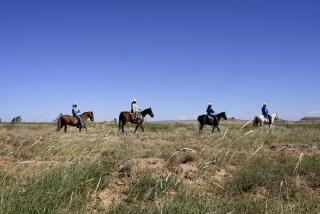Campaign for Cherokee Chief Comes to L.A. : Native Americans: Forum is held in Bell Gardens for seven contenders seeking absentee votes. About 4,000 members of the Oklahoma-based tribe live in California.
James R. Burris was a long way from home Saturday looking for votes in his quest to become chief of the Cherokee Nation of Oklahoma.
“This is a nationwide campaign,” said Burris, who has traveled to almost a dozen states. “It’s the equivalent of a governor’s state race, except you have to go to a bunch of states,” he said about the quest to head the tribe of 167,000.
Burris was one of seven candidates for chief who attended a forum in Bell Gardens held for Cherokees living in Southern California. Some of the candidates had been in Sacramento on Friday night. All are seeking votes among the estimated 4,000 Cherokees in California who are eligible to cast absentee ballots in the June 17 election.
“It actually is the difference between getting voted in and not getting voted in,” Burris said.
Mary Elizabeth Birmingham, the only woman running for chief, said she has relatives all over the country organizing meetings like the one in Bell Gardens. “It’s real important that we get the word out about our platforms,” she said.
The candidates pressed the flesh just as local politicians would do as they discussed their vision for the Cherokees, whose tribal headquarters is in Tahlequah, Okla.
It was another example of how the world comes looking for votes in Los Angeles.
Earlier this year, the search was on for French citizens who live here but who were still eligible to vote in that country’s presidential election. Last year 30,000 South African emigres living in California were able to cast votes in the election that made Nelson Mandela their homeland’s first black president. And two years ago, Russia offered its expatriates living in the state the opportunity to vote on a referendum on Russian President Boris Yeltsin.
Some of those who attended Saturday’s forum “want more input in tribe matters,” said Colleen Colston, the American Indian liaison with the Los Angeles County Health Department. “The only time people pay attention to us is when they are courting our votes,” she said, sounding like voters everywhere.
Much is at stake for the tribe because of fears over the possible loss of federally funded programs, which this year accounted for half of the tribe’s $144-million budget.
“In these tough economic times, the tribe is going to have to be more self-sufficient,” Colston said.
Colston said the candidate she will back must be concerned with issues such as education and health care while paying attention to the needs of Cherokees living outside the reservation.
Election outcomes have often been determined by absentee ballots because of the number of Cherokees who no longer live on the reservation, said candidate George Wickcliffe.
Billie Nave Masters, an adjunct professor of Native American Studies at Cal State Long Beach, said some of the absentee voters are Cherokees who moved away to pursue education and employment.
Those no longer on the reservation are important for more than their votes, Masters said, because they often provide financial help for those who remain behind. “The actual stability of people at home is dependent on those of us who leave to find work and education,” Masters said. “The strength of the reservation is that we all do go home a lot.”
The majority of the candidates said their platforms include making sure Cherokees who live outside of Oklahoma feel included in tribal matters.
“I think the critical issue is the identity of the Cherokee and how to maintain that identity,” candidate Chad Smith said. “The Cherokee Nation is not a nation of territory, it’s a nation of people.”
Those who came to the forum said they wanted to hear the candidates’ stance on issues, but they also sought the opportunity for fellowship with other Cherokees and to catch up on news from home.
Before the meeting, Charlie Masters stood talking with Jim Welch, who was traveling with one of the candidates and lives one-fourth of a mile from Masters parents’ home in White Water, Okla. Masters has lived in California for 20 years and the pair reminisced about a swimming hole in White Water where Masters played as a boy.
“We do file absentee ballots,” Master’s wife said, watching them. “But we’re not absent from home in our hearts.”
More to Read
Sign up for Essential California
The most important California stories and recommendations in your inbox every morning.
You may occasionally receive promotional content from the Los Angeles Times.









